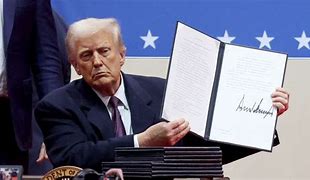Star Parker her recent column “Trump’s DEI executive order — good for Blacks, good for America ” Parker’s arguement in favor of Donald Trump’s executive order against Diversity, Equity, and Inclusion (DEI) initiatives is fundamentally flawed in multiple ways. While she presents the order as a reinforcement of “individual freedom” and “e pluribus unum,” her analysis ignores the systemic barriers that DEI seeks to address, misinterprets economic data, and overlooks the broader implications of dismantling diversity programs in both the federal workforce and American society.
She asserts that America thrives on the principle of “e pluribus unum”—out of many, one—suggesting that unity is best achieved by eliminating policies that acknowledge racial disparities. However, this perspective disregards the historical and structural inequities that have long divided Americans. True unity does not arise from ignoring differences but from addressing them in a way that fosters inclusion and equal opportunity. DEI initiatives aim to remove institutional barriers that have disadvantaged marginalized groups, particularly Black Americans, rather than creating division.
She cites statistics from Pew Research indicating that Black Americans constitute 18.6% of the federal workforce despite being only 14.4% of the general population. She argues that this disproportionality suggests a dependency on government jobs rather than a lack of equity. However, this analysis fails to consider key factors such as historical hiring discrimination in the private sector, the long-standing appeal of stable government employment to Black professionals due to past exclusion from other industries, and the ongoing wage and promotion gaps that persist even within the federal system. The presence of Black workers in federal jobs does not negate the necessity of DEI initiatives to ensure fair hiring and advancement practices.
Parker presents median income statistics to argue that Black Americans are no longer economically oppressed, highlighting that 54% of Black households earn over $50,000. While this data may indicate progress, it does not account for the racial wealth gap, which remains vast due to centuries of systemic discrimination. Wealth, not just income, determines long-term economic stability and generational mobility. Black families, on average, have significantly less wealth than white families, making it harder to access quality education, homeownership, and capital for business ventures. DEI programs seek to mitigate these disparities by promoting equitable access to opportunities, not by fostering dependency.
A core flaw in Parker’s argument is the assumption that government intervention inherently limits individual freedom. She contrasts “individual freedom” with “government power,” portraying DEI initiatives as an example of the latter. However, DEI policies do not impose restrictions on individuals; rather, they ensure that institutions operate fairly by addressing biases that have historically excluded certain groups. Without such frameworks, the playing field remains uneven, perpetuating inequalities rather than fostering true meritocracy.
Parker draws a parallel between Trump and Abraham Lincoln, arguing that Trump’s executive order represents a “new birth of freedom.” This analogy is historically inaccurate. Lincoln’s leadership during the Civil War was focused on ending slavery and expanding rights for Black Americans, not dismantling policies aimed at leveling the playing field. Trump’s executive order, by contrast, seeks to erase efforts that acknowledge and rectify racial disparities, effectively undermining progress rather than championing freedom.
Parker’s argument against DEI initiatives is rooted in a fundamental misunderstanding of their purpose and impact. By promoting the notion that acknowledging racial disparities divides the nation, she overlooks the reality that systemic inequities cannot be addressed through colorblind policies alone. The pursuit of a more inclusive and equitable America requires policies that actively dismantle barriers to opportunity, not executive orders that ignore their existence. The evidence overwhelmingly supports the necessity of DEI initiatives in fostering a fairer society—one where “e pluribus unum” is more than just an ideal, but a lived reality for all Americans.


































